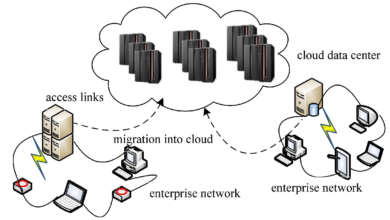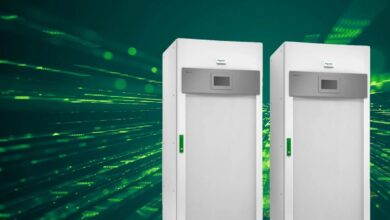Innovative Uses for Data Servers
As the world becomes increasingly data-driven, the role of data servers in powering innovation is more crucial than ever. Data servers, the backbone of modern technology, serve as the storage and processing units for vast amounts of information. However, they offer far more than just storage and processing capabilities. In this blog article, we will explore the innovative uses of data servers and how they are transforming industries across the globe.
From healthcare to finance, data servers are revolutionizing the way we operate, analyze, and leverage data. With the ability to store and process massive amounts of information in real-time, organizations can gain valuable insights, make informed decisions, and drive innovation. In this comprehensive guide, we will delve into ten key areas where data servers are making a significant impact, paving the way for groundbreaking advancements.
Predictive Analytics: Anticipating the Future
Summary: Discover how data servers enable predictive analytics, allowing businesses to forecast trends, mitigate risks, and optimize operations.
Enhancing Business Intelligence
With the help of data servers, businesses can harness the power of predictive analytics to gain a competitive edge in the market. By analyzing historical data and identifying patterns, businesses can anticipate customer behavior, market trends, and demand fluctuations. This allows them to make data-driven decisions, optimize their operations, and stay ahead of the competition.
Optimizing Supply Chain Management
Data servers play a crucial role in optimizing supply chain management through predictive analytics. By analyzing data related to inventory levels, production rates, and customer demand, businesses can accurately forecast future demand, streamline their supply chain processes, and reduce costs. This leads to improved efficiency, minimized stockouts, and enhanced customer satisfaction.
Preventing Equipment Failures
Data servers enable predictive maintenance by analyzing data from sensors and other monitoring devices. By detecting anomalies and patterns in the data, businesses can predict equipment failures before they occur. This proactive approach to maintenance helps minimize downtime, optimize asset utilization, and reduce maintenance costs.
Artificial Intelligence and Machine Learning: Unleashing Intelligent Automation
Summary: Explore how data servers power the development and deployment of AI and machine learning algorithms, driving automation and efficiency across various sectors.
Automating Repetitive Tasks
Data servers, combined with AI and machine learning algorithms, enable businesses to automate repetitive tasks that were previously performed manually. For example, in customer service, chatbots powered by data servers can handle customer inquiries, freeing up human agents to focus on more complex issues. This leads to improved efficiency, enhanced customer experience, and cost savings.
Personalizing Customer Experiences
Data servers facilitate the collection and analysis of customer data, enabling businesses to personalize their interactions. By understanding customer preferences, behavior, and purchase history, businesses can deliver targeted recommendations, personalized marketing campaigns, and customized product offerings. This personalized approach enhances customer satisfaction, loyalty, and ultimately drives revenue growth.
Enhancing Fraud Detection
Data servers play a crucial role in fraud detection by leveraging AI and machine learning algorithms. By analyzing vast amounts of data, including transaction records, user behavior patterns, and historical fraud cases, businesses can identify suspicious activities in real-time. This proactive approach helps prevent financial losses, protect customer information, and maintain trust in the digital marketplace.
Internet of Things (IoT): Enabling a Connected World
Summary: Learn how data servers facilitate the seamless integration and analysis of IoT-generated data, revolutionizing industries like smart cities, healthcare, and manufacturing.
Optimizing Resource Utilization in Smart Cities
Data servers enable the collection and analysis of data from various IoT devices deployed in smart cities. By analyzing data related to energy consumption, traffic patterns, waste management, and more, city authorities can optimize resource utilization, reduce environmental impact, and enhance the quality of life for residents. Smart street lighting, intelligent transportation systems, and waste management solutions are just a few examples of how data servers are transforming city infrastructure.
Improving Patient Care in Healthcare
Data servers play a critical role in healthcare by enabling the integration and analysis of data from medical devices, wearables, and electronic health records. By analyzing patient data in real-time, healthcare providers can personalize treatment plans, detect early signs of diseases, and improve patient outcomes. Remote patient monitoring, telemedicine, and predictive diagnostics are some of the innovative applications enabled by data servers in the healthcare industry.
Enhancing Efficiency in Manufacturing
Data servers, combined with IoT devices, revolutionize the manufacturing industry by enabling real-time monitoring and analysis of machine performance, production lines, and supply chain processes. By collecting and analyzing data from sensors, businesses can identify bottlenecks, optimize production schedules, and reduce downtime. This leads to improved efficiency, increased productivity, and cost savings.
Cybersecurity: Safeguarding Data in the Digital Age
Summary: Delve into how data servers play a crucial role in fortifying cybersecurity measures, protecting sensitive information from cyber threats and ensuring data integrity.
Implementing Advanced Threat Detection
Data servers facilitate the implementation of advanced threat detection systems that continuously monitor network traffic and data access. By analyzing patterns and anomalies, these systems can identify potential cyber threats, such as malware, phishing attempts, and unauthorized access. This proactive approach helps businesses detect and respond to threats in real-time, minimizing the impact of cyber attacks.
Securing Data with Encryption
Data servers enable businesses to encrypt sensitive data, both at rest and in transit, to protect it from unauthorized access. Encryption algorithms, combined with secure key management systems, ensure that data remains secure even if it falls into the wrong hands. This safeguards customer information, intellectual property, and confidential business data, instilling trust among stakeholders.
Enabling Secure Remote Access
Data servers facilitate secure remote access to corporate networks, allowing employees to work from anywhere without compromising data security. Virtual private networks (VPNs), secure socket layer (SSL) protocols, and multi-factor authentication mechanisms ensure that data remains encrypted and only accessible to authorized personnel. This flexibility in remote work arrangements enhances productivity while maintaining a high level of data security.
Cloud Computing: Empowering Scalability and Flexibility
Summary: Understand how data servers underpin cloud computing infrastructure, allowing businesses to scale effortlessly and access resources on-demand.
Scalable Infrastructure as a Service (IaaS)
Data servers form the foundation of Infrastructure as a Service (IaaS) offerings, enabling businesses to scale their computing resources on-demand. With data servers in the cloud, businesses can easily provision virtual machines, storage, and networks to meet their changing needs. This scalability eliminates the need for upfront investments in hardware and allows businesses to adapt quickly to changing market conditions.
Flexible Platform as a Service (PaaS)
Data servers power Platform as a Service (PaaS) solutions, providing businesses with a flexible development environment for building and deploying applications. By leveraging data servers in the cloud, businesses can focus on developing their applications without worrying about the underlying infrastructure. This flexibility accelerates application development cycles, reduces time to market, and improves collaboration among development teams.
Efficient Software as a Service (SaaS)
Data servers enable Software as a Service (SaaS) providers to deliver applications over the internet, eliminating the need for customers to install and maintain software locally. By leveraging data servers in the cloud, businesses can access software applications, such as customer relationship management (CRM) systems, enterprise resource planning (ERP) solutions, and collaboration tools, on a subscription basis. This eliminates upfront software licensing costs and simplifies software maintenance and updates.
Data Visualization: Transforming Complex Data into Actionable Insights
Summary: Discover how data servers enable the visualization of complex data, empowering decision-makers to gain meaningful insights and communicate information effectively.
Interactive Dashboards for Data Exploration
Data servers facilitate the creation of interactive dashboards that allow decision-makers to explore data visually. By presenting complex data in an intuitive and visually appealing manner, businesses can uncover patterns, trends, and correlations that may go unnoticed in traditional tabular formats. Interactive dashboards enable decision-makers to drill down into specific data points, filter information, and gain actionable insights in real-time.
Ngadsen test2
Geospatial Visualization for Location-based Analysis
Data servers enable the visualization of geospatial data, allowing businesses to analyze information in the context of location. By overlaying data onto maps, decision-makers can identify spatial patterns, optimize routes, and make location-based decisions. This is particularly useful in industries such as logistics, retail, and urban planning, where understanding the geographical distribution of data is crucial.
Visual Storytelling for Effective Communication
Data servers empower decision-makers to communicate insights effectively through visual storytelling. By combining data visualizations with narratives, businesses can present complex information in a compelling and easy-to-understand manner. Visual storytelling engages stakeholders, facilitates data-driven decision-making, and enhances communication across departments.
Financial Analytics: Driving Informed Decision-Making in Finance
Summary: Explore how data servers are revolutionizing financial analytics, enabling real-time data processing, risk assessment, and performance optimization in the finance industry.
Real-Time Market Data Analysis
Real-Time Market Data Analysis
Data servers play a critical role in financial analytics by enabling real-time analysis of market data. By collecting and processing data from various sources such as stock exchanges, news feeds, and social media, financial institutions can make informed investment decisions and react quickly to market changes. Real-time market data analysis allows for the identification of trends, patterns, and anomalies, helping traders and investors optimize their strategies and maximize returns.
Risk Assessment and Management
Data servers enable financial institutions to assess and manage risks more effectively. By analyzing historical data, market trends, and macroeconomic indicators, data servers can identify potential risks, such as credit default, market volatility, or liquidity issues. This allows financial institutions to implement risk mitigation strategies, optimize capital allocation, and ensure compliance with regulatory requirements. Real-time risk monitoring and analysis empower financial institutions to make timely decisions and safeguard their financial stability.
Performance Optimization and Portfolio Management
Data servers facilitate performance optimization and portfolio management by providing comprehensive insights into investment portfolios. By analyzing historical performance data, market trends, and risk factors, financial institutions can optimize portfolio allocation, rebalance investments, and identify opportunities for diversification. Data servers enable the creation of sophisticated models and algorithms that assist in portfolio optimization, ensuring that investment decisions are aligned with the institution’s objectives and risk appetite.
Healthcare Informatics: Enhancing Patient Care and Research
Summary: Learn how data servers are transforming healthcare informatics, facilitating seamless data sharing, personalized medicine, and advancements in research and diagnostics.
Seamless Electronic Health Record (EHR) Integration
Data servers enable the seamless integration of electronic health records (EHR), allowing healthcare providers to access and share patient information securely. By consolidating patient data from various sources, such as hospitals, clinics, and laboratories, data servers facilitate comprehensive patient profiles. This improves care coordination, reduces medical errors, and enhances patient outcomes. Healthcare professionals can access up-to-date patient information, including medical history, test results, and treatment plans, enabling them to make informed decisions and provide personalized care.
Personalized Medicine and Precision Diagnostics
Data servers play a crucial role in personalized medicine by enabling the analysis of genomic and clinical data. By combining patient-specific genetic information with clinical data, healthcare providers can develop personalized treatment plans tailored to an individual’s unique genetic makeup. Data servers facilitate the storage, processing, and analysis of massive genomic datasets, allowing for the identification of genetic markers, prediction of disease risks, and targeted therapies. Precision diagnostics, enabled by data servers, help healthcare professionals make accurate diagnoses and select the most effective treatment options.
Advancements in Medical Research and Clinical Trials
Data servers are transforming medical research and clinical trials by enabling the analysis of large-scale datasets. By aggregating and analyzing data from multiple sources, such as electronic health records, genetic databases, and clinical trial results, researchers can identify patterns, biomarkers, and treatment responses. Data servers facilitate collaboration among researchers and institutions, providing a secure and scalable infrastructure for data storage, processing, and analysis. This accelerates the pace of medical research, facilitates evidence-based medicine, and leads to the development of innovative therapies and interventions.
Energy Management: Optimizing Resource Efficiency
Summary: Discover how data servers contribute to energy management by monitoring, analyzing, and optimizing energy consumption, leading to reduced environmental impact and cost savings.
Smart Grid Optimization
Data servers play a crucial role in smart grid optimization by collecting and analyzing data from energy meters, sensors, and other monitoring devices. By monitoring energy consumption patterns, peak demand periods, and grid stability, data servers enable utilities to optimize energy distribution, reduce transmission losses, and improve overall grid efficiency. Smart grid optimization helps meet the increasing demand for energy while minimizing environmental impact and reducing operational costs.
Building Energy Management
Data servers enable building energy management systems by collecting and analyzing data from sensors, meters, and HVAC systems. By monitoring energy usage, occupancy patterns, and environmental conditions, data servers facilitate the optimization of building energy consumption. Real-time data analysis allows for the identification of energy-saving opportunities, such as adjusting temperature setpoints, optimizing lighting schedules, and detecting equipment inefficiencies. Building energy management systems, powered by data servers, lead to reduced energy costs, improved occupant comfort, and enhanced sustainability.
Renewable Energy Integration
Data servers enable the integration and optimization of renewable energy sources, such as solar panels and wind turbines, into the power grid. By analyzing data related to weather conditions, energy production, and demand patterns, data servers facilitate the efficient utilization of renewable energy resources. Real-time data analysis allows for the adjustment of energy generation and consumption to match supply and demand, reducing reliance on fossil fuels and promoting the use of clean, sustainable energy sources. The integration of renewable energy sources, supported by data servers, contributes to a greener and more resilient energy infrastructure.
Retail Analytics: Enhancing Customer Experience and Sales
Summary: Explore how data servers drive retail analytics, enabling businesses to understand customer behavior, personalize marketing strategies, and optimize inventory management.
Customer Segmentation and Targeted Marketing
Data servers enable retail businesses to analyze customer data and segment their customer base based on various attributes, such as demographics, shopping behavior, and preferences. By understanding customer segments, businesses can develop targeted marketing strategies, personalized promotions, and tailored product offerings. Data servers facilitate the collection, storage, and analysis of customer data, allowing businesses to deliver relevant and personalized experiences that resonate with their target audience.
Optimized Inventory Management
Data servers play a crucial role in optimizing inventory management by analyzing sales data, demand patterns, and supply chain information. By leveraging real-time data analysis, businesses can forecast demand, identify slow-moving products, and optimize inventory levels. This helps reduce carrying costs, minimize stockouts, and improve overall supply chain efficiency. Data servers enable businesses to make data-driven inventory management decisions, ensuring that the right products are available at the right time and in the right quantities.
Enhanced Customer Experience through Personalization
Data servers enable retail businesses to deliver personalized customer experiences across various touchpoints, such as online platforms, mobile apps, and in-store interactions. By analyzing customer data, including purchase history, browsing behavior, and feedback, businesses can provide relevant recommendations, customized offers, and personalized customer service. This personalized approach enhances customer satisfaction, fosters loyalty, and drives repeat business.
In conclusion, data servers have transcended their traditional role as storage and processing units by unlocking the power of big data. The innovative uses of data servers showcased in this article demonstrate their pivotal role in driving progress across numerous industries. As we continue to generate and accumulate vast amounts of data, the capabilities of data servers will only expand, opening doors to uncharted possibilities. Embracing these innovative uses of data servers is key to staying competitive and harnessing the true potential of big data in the digital era.



